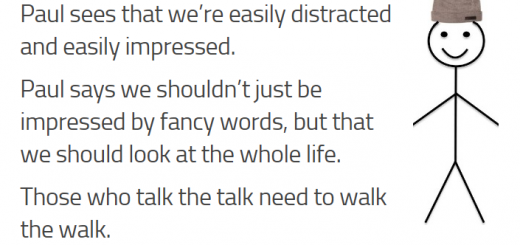Empathy could change the world
So in everything, do to others what you would have them do to you, for this sums up the Law and the Prophets. Matthew 7:12
The Law that God gave to his people to map out for them the best way to live started out as the ten commandments given by God to Moses in Exodus 20. However, it wasn’t as simple as that. By the end of the Old Testament, God had given 613 commandments to His people about how to live in relationship with Him and with one another.
 Following in God’s way became an exercise in following a whole lot of set rules. In some ways, life is easier like that. If life came with a set of rules like a board game, then winning at life would be a whole lot easier. Everything would be black and white. But real life isn’t like that, is it? Real life is messy and complicated. There aren’t enough rules out there to cover every eventuality that life throws at us.
Following in God’s way became an exercise in following a whole lot of set rules. In some ways, life is easier like that. If life came with a set of rules like a board game, then winning at life would be a whole lot easier. Everything would be black and white. But real life isn’t like that, is it? Real life is messy and complicated. There aren’t enough rules out there to cover every eventuality that life throws at us.
People were coming to Jesus confident in their spirituality because they knew how to play the game. They’d figured out all the rules and were expert in sticking to them. They became self-righteous, relying on how good they were compared to those around them. And so Jesus strips it all back. He simplifies it all down here to one simple rule: one simple rule that encompasses all the other rules about how to live in relationship with others. This instruction covers all the specific laws already laid out by God – and a whole lot more besides.
We’re good at complicating things when we don’t need to, aren’t we? We say we’d do what Jesus wants of us if we knew what that was, but we do know. This is what he wants. This is how he wants us to live. And not just loving those who are easy to love. Not just being nice to those who are nice to you. Not just lending to those who you are sure will pay you back. Anyone can do that. Everyone does that. Jesus expects a whole lot more from his followers than that.
But to you who are listening I say: Love your enemies, do good to those who hate you, bless those who curse you, pray for those who mistreat you. If someone slaps you on one cheek, turn to them the other also. If someone takes your coat, do not withhold your shirt from them. Give to everyone who asks you, and if anyone takes what belongs to you, do not demand it back. Do to others as you would have them do to you.
If you love those who love you, what credit is that to you? Even sinners love those who love them. And if you do good to those who are good to you, what credit is that to you? Even sinners do that. And if you lend to those from whom you expect repayment, what credit is that to you? Even sinners lend to sinners, expecting to be repaid in full. But love your enemies, do good to them, and lend to them without expecting to get anything back. Then your reward will be great, and you will be children of the Most High, because he is kind to the ungrateful and wicked. Be merciful, just as your Father is merciful. Luke 6:27-36
Do to others what you would have them do to you.
In every situation, it’s about putting yourself in the position of the other. Taking into consideration how you arrived at this position. Imagining how you would like to be treated if you were them.
If that were me, then…
This is empathy.
Empathy: the capacity to place oneself in another’s position
 Empathy could change the world.
Empathy could change the world.
Empathy changes how we treat others, because we understand where they are coming from. We get a glimpse of how they are feeling. We recognises their needs. We treat them as we would want to be treated in their situation.
There’s an episode of ‘Black Mirror’ that we watched the other day that plays this out beautifully. In Season 3 Episode 5 ‘Men Against Fire’, the soldiers are impregnated with a mask when they enter the army, a mask that physically changes the way they see and hear a certain group of people. They no longer see them as human but as beasts. These individuals no longer have names and faces: each one is ‘Roach’ and each one needs to be exterminated. It makes them easier to kill when you longer view them as human. When the mask slips for one particular soldier and he glimpses the truth, then how can he possibly carry on? You’ll have to watch it yourself to find out!
It’s incredibly hard to live with empathy. Somewhere along the line, we’ve been programmed to think first and foremost of ourselves. We’ve fallen into line with the whole ‘survival of the fittest’ thing. We’ve been encouraged to believe that independence is the way forward, fighting for what we deserve and protecting it with our lives. We don’t ask for help and we don’t offer help. Life is simpler that way.
If we started to live with empathy, our lives would change forever. We’d have to stop judging others for a start.
Do not judge, or you too will be judged. For in the same way you judge others, you will be judged, and with the measure you use, it will be measured to you.
Why do you look at the speck of sawdust in your brother’s eye and pay no attention to the plank in your own eye? How can you say to your brother, ‘Let me take the speck out of your eye,’ when all the time there is a plank in your own eye? You hypocrite, first take the plank out of your own eye, and then you will see clearly to remove the speck from your brother’s eye. Matthew 7:1-5
Would you really want someone else to criticise you the way you criticise them? To call you the names and give you the labels that you give them? You know the the things you say about them. Would you like them to say such things about you? You judge them without really knowing and understanding their situation. How would you feel if they did the same to you?
I recently observed someone criticising someone else for their rudeness and then they went on to do something that I considered to be equally as rude. It made me see that we justify our own actions and words (our own rudeness), because we understand where we’re coming from and feel completely justified in behaving in that way. It makes perfect sense to us. But if we are to be that lenient and understanding of ourselves, maybe we need to be finding a way to show that level of leniency and understanding to others.
For many of us, that’s a whole new way of thinking and behaving.
In Luke 17, Jesus gives some specific examples about how to live in relationship with others in the way God would want us to. He warns us to watch what we say and do, because what we say and do affects others too and we have to be accountable for the effect our words and behaviour can have on another.
It’s right to let people know when they have upset us or offended us in some way, but then when they say sorry, we have to be ready to forgive them and move on – time and time and time again. Tough stuff, isn’t it?
And don’t expect praise for being kind to people or forgiving or generous. For that is the way we are all supposed to behave. We don’t need praise for that.
Imagine what life would be like in our churches if we really took this teaching on board. Some of us have experienced or observed how churches and the Christian world in general can be one of the most judgemental places out there. Imagine if as Christians, we really grasped what it was to treat others as we would want to be treated – to really try to understand why someone is behaving the way that they are and to demonstrate compassion and love and understanding rather than judgement.
That’s not to say that anything goes. There must be a way of being accountable to each other, trusting each other to speak up in truth and love (you can’t have one without the other).
If your brother or sister sins, go and point out their fault, just between the two of you. If they listen to you, you have won them over. But if they will not listen, take one or two others along, so that ‘every matter may be established by the testimony of two or three witnesses.’ If they still refuse to listen, tell it to the church; and if they refuse to listen even to the church, treat them as you would a pagan or a tax collector.
Truly I tell you, whatever you bind on earth will be bound in heaven, and whatever you loose on earth will be loosed in heaven.
Again, truly I tell you that if two of you on earth agree about anything they ask for, it will be done for them by my Father in heaven. For where two or three gather in my name, there am I with them. Matthew 18:15-20
I’ve been on the receiving end of this kind of thing: when other Christians have felt that I am way out of line and need correction. It’s not been done in the way outlined above though. If it had, maybe there would have been a whole lot less hurt. As far as I can see from this passage, there’s a clear process here – and it’s here for a reason.
-

Not the way to do it!
If you’re concerned about the way someone is behaving, then go see them about it. Don’t talk to anyone else. Go to the person directly. Don’t take anyone else to back you up. Keep it between the two of you. Go with the objective of understanding the situation from their point of vies. Allow them to speak and make sure you really listen.
- If you’re then still concerned, then choose two of three reliable people to be involved. Not just those people who will agree with you, but people you trust to act from mercy and love and compassion and wisdom. I would suggest that you invite the other person to bring someone along too. Again, this is still to be kept in confidence among just a few people.
- Remember that when two or three are gathered together, Jesus is there among them. Take time to recognise his presence among you. Whatever is said and done is said and done in the presence of Jesus.
- If the issue is something that cannot be resolved and cannot be condoned – if it is something illegal or is a safeguarding issue – then the whole church needs to hear about it. Whispered conversations at the back of church are not good enough. Someone removed from a position in the church without explanation causes wild speculation that can do even more harm. There needs to be some carefully worded announcement from the front that doesn’t breach confidence but makes everyone aware of the situation.
- If the situation needs to be taken further, then the advice here is to treat them like a pagan of tax collector. But before we rush in, consider how Jesus treated pagans and outsiders. Yes, they were outsiders, but there was always the opportunity for change. Jesus still engaged with them. He didn’t cut them off completely or refuse to have anything to do with them. Quite the opposite.
There’s a huge amount to process here, isn’t there?
I guess I’ll leave you with this one simple exercise that could revolutionise your life forever!
Think about how you treat other people. At the end of the day, look back on the way you’ve treated other people that day.
And with that in mind, ask yourself this question –
Do I really want other people to treat me as I have treated people today?












